Prepositional PhraseWhat is the meaning of preposition? What actually is the distinction between prepositions and prepositional phrases? And how do you decide when you should use one? In this article, we will explore the basics, concepts and essentials of what they are and provide some relevant examples. 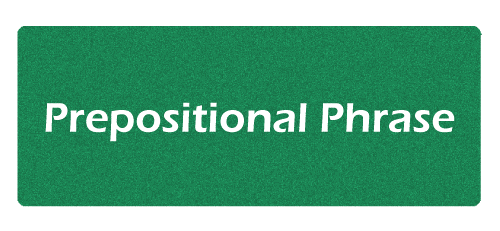
What Exactly Is a Prepositional Phrase?Before we can describe a prepositional phrase, we should first understand what a preposition is. The goal is to determine where something is in respect to another. A preposition is a term that governs the use of a noun or pronoun. It can be employed before or after the nouns, pronouns, infinitives, or gerunds. Prepositions are quite adaptable. They can represent time, place, spatial relations, directions, and other abstract ideas. 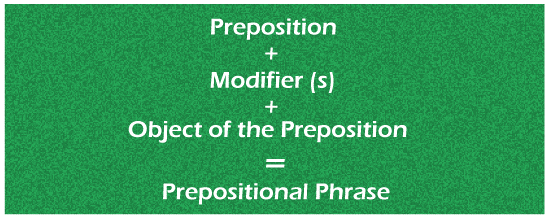
Below are few examples of these many types of prepositions :
Now that you understand what a preposition is let's look at what creates a prepositional phrase. A prepositional phrase is merely a collection of words that includes a preposition and its object. Words that change the object can also be included. The modifier is usually the noun, infinitive, or gerund type of the linked verb. One must be aware of various distinct forms of prepositional phrases. These will be covered in the below-mentioned section. Remember that prepositions are terms that express the links between different elements in a statement, and you'll have no trouble detecting prepositional phrases. A prepositional phrase is a collection of words that act as a cohesive part of speech despite the absence of the verbs or the subjects. It typically comprises of a preposition followed by a noun or a preposition followed by a pronoun. Rules of Prepositional PhraseRemembering the following guidelines for prepositional phrases will make employing them much easier.
Prepositions and the objects of the prepositions are the minimal conditions for generating the prepositional phrases, just as bread and butter are the minimum necessary for making a decent sandwich. The title of the nouns or the pronouns that follow the preposition is the object of the prepositions. Prepositional sentences do not have to be straightforward. Adding other words, such as adverbs or adjectives, is an excellent way to spice up prepositional phrases, just like adding more components to a sandwich. As you examine the prepositional phrase examples below, you'll note that the first statement in each set comprises a basic prepositional phrase, whereas the second comprises a more fascinating one. Prepositional Phrase ExamplesThe below-mentioned sentences provide instances of prepositional phrases; the prepositional phrase for each statement is italicized for ease of identification.
Prepositional Phrase TypesA prepositional phrase usually alters a verb or a noun. Adverbial and adjectival prepositional phrases are the two types of prepositional phrases. Here is how to tell the difference. 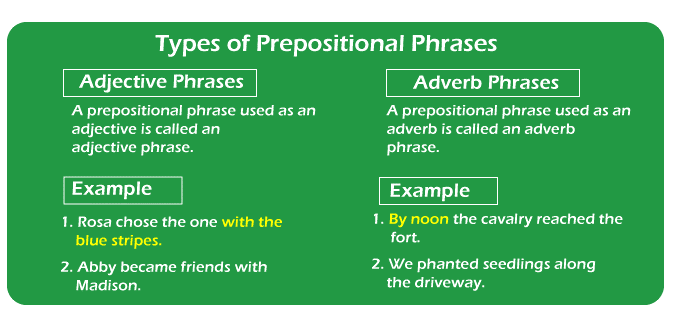
1. Prepositional Adverbial PhrasesThe prepositional phrases that alter the verb is known as the adverbial or adverb prepositional phrases. Since adverbs change the verb, it is understood to act adverbially when the phrase works on the verb. Below are some of the adverbial prepositional phrases: E.g. 1: "The cat leaped up in delight. " E.g. 2: "Check in the canteen to find the lecturer who teaches physics. " Now let us have a look at the other type of the prepositional phrase 2. Prepositional Adjective PhrasesThe prepositional phrases that change the noun is known as the adjectival or adjective prepositional phrases. Adjective phrases are formed when a prepositional phrase performs adjectively. Here are two instances of prepositional adjectives : Example 1: "The artwork on the beginning is the finest. " Example 2 "Michael wants to eat at the cafe near the mall, " 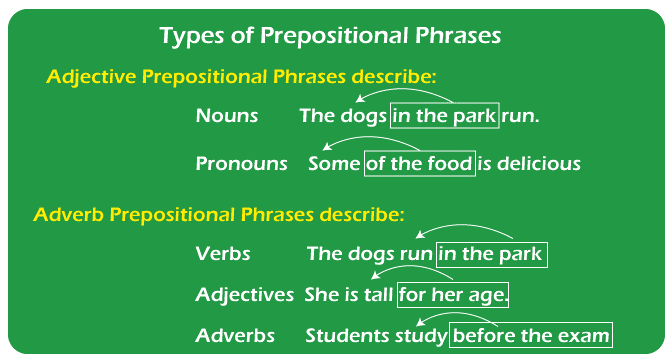
3. Prepositional Phrases That Act as NounsIn addition to adverb and adjective prepositional phrases, certain prepositional phrases can function as nouns. This does not happen that frequently, but it's something to be cautious of. Here are some instances of prepositional phrases that can be used as nouns: Example 1: "Before the exhibition will be too soon for us to go to dinner." Example 2: "During the interval time is the perfect time to speak to your pals." Prevalent Prepositional Phrase MistakesThere are a few typical mistakes that authors make that one must be mindful of no matter what form of the prepositional phrase you use. Here are three frequent pitfalls to avoid while writing with prepositional phrases: 1. Never place your prepositional phrase vaguely 2. Never treat or consider the prepositional phrase as the subject of the verbs. 3. One should limit the excessive usage of the Prepositional Phrases. Prepositional phrases may appear difficult at first, but they may be identified with practice. Always find the common prepositions such as the ones listed above. Avoid typical errors such as making the prepositional phrases the subjects of the verbs. Prepositions and prepositional phrases will become part of the routine as you exercise. Common Prepositional PhrasesAlthough there are several phrases, these are some of the most common prepositional phrases.
Examples of Prepositional Phrases as AdjectivesAdjectives alter the nouns, pronouns, and other adjectives. They might be simple terms that convey more information. "The ancient book seemed so fascinating," for example. On the other hand, prepositional phrases can function as adjectives, offering additional information about nouns. Examine how they can inform us more about the nearby noun (in italics):
Examples Of Prepositional Phrases as AdverbsAdverbs change verbs and other adverbs, whereas adjectives alter nouns. They, too, can be made up of simple terms. "She hurriedly raced for the gate," for instance. Prepositional phrases can also function as adverbs, offering further information about verbs (shown in italics). As an example:
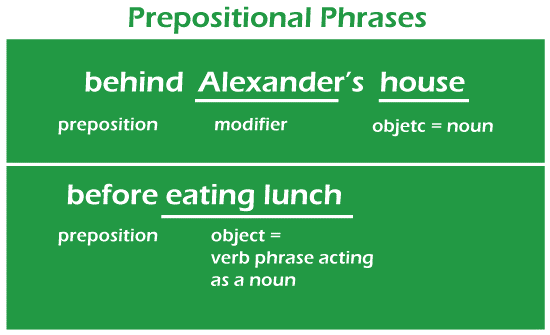
Some More Types or Forms of Prepositional PhrasesThe Noun-Modifying Prepositional Phrase That Works As AdjectivesA prepositional phrase can function on a noun, and in this situation, it acts in the same manner that an adjective might because an adjective can alter a noun. In this scenario, the prepositional phrase is known as an adjectival phrase. Let us look at a few instances of this.
The adjectival phrase is employed in the preceding examples to provide additional information about the noun. The first sentence provides more details about the location of the bird, whereas the second sentence provides more details about the location of the apartment. The prepositional phrase provides further detail, which an adjective would ordinarily accomplish. The Prepositional Phrase That Alters A VerbIn some cases, the prepositional phrase can operate on a verb, which is known as adverbial behaviour. This is due to the fact that an adverb is typically employed to change a verb. Adverbial phrases are formed when a prepositional phrase is utilized in this manner. Let us look at some examples of this.
In both of the preceding cases, the adverbial phrase answers the query 'in what way?' The first instance could be a response to the query, "Who is banging on the door?" The second instance could be a response to the question, "How did Michael walk along the road." Prepositional Phrases That Function As NounsPrepositional phrases can occasionally function as nouns in a statement
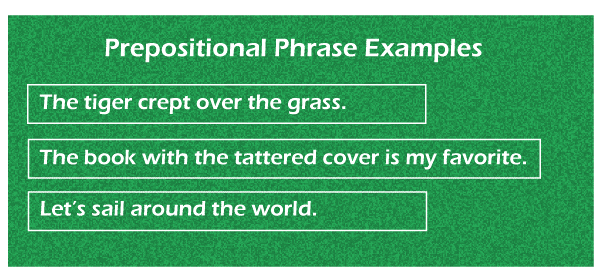
How to Avoid Using Too Many Prepositional PhrasesIt's easy to employ too many prepositions and prepositional phrases. If you notice more than one preposition every 10 or 15 words in your writings, you must remove some of them. When you put in the work, you will be amazed to see how much more graceful and efficient your writing becomes. It is ideal to act with due care when running with a dagger in the existence of Superman. This statement contains no grammatical errors, but it contains two "with" phrases, an "of" phrase, and an "in" phrase, indicating that it may be expressed more effectively. In Superman's presence, run carefully with daggers. Switching from an inactive to an active voice is another approach to decrease prepositional phrases. There is a well-known example to demonstrate this principle. Why was the street crossed by the dog? Evidently, the passive voice makes this statement cumbersome, and the prepositional phrase alongside the dog sounds a bit odd. It would be efficiently expressed in an active voice, with the dog in the driving seat where it belonged. Why did the dog cross the street? Prepositional phrases should be used with caution since they can be confusingly placed, excessively used, or incorrectly placed. If there is true ambiguity, place your prepositional phrase next to or rewrite your sentence. ConclusionPrepositional phrases are a powerful way to add information. Also, they can serve as adjectives and function as adverbs. Now that you are accustomed to prepositional phrases start practising them on your own.
Next TopicAdverbial Phrase
|
 For Videos Join Our Youtube Channel: Join Now
For Videos Join Our Youtube Channel: Join Now
Feedback
- Send your Feedback to [email protected]
Help Others, Please Share










